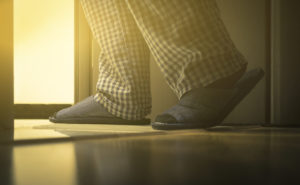What is nocturia?
Nocturia is a urological condition that most people are familiar with – the need to urinate several times during the night. Statistics indicate that this common condition affects approximately 50 million Americans. Furthermore, numbers shows that one in three adults urinate at least two times during the night.
Types of nocturia
In order to accurately diagnose this condition, it’s important to understand the type of nocturia a person is experiencing as well as isolating the underlying cause. The different types of nocturia are as follows:
- Polyuria – This urological condition is associated with the production and passage of large amounts of urine during a 24 hour period.
- Nocturnal polyuria – A urological condition in which the body produces excessive amounts of urine during the nighttime.
- Bladder storage – This type of nocturia originates with a bladder that is incapable of adequately holding or releasing urine.
- Mixed nocturia – This condition is diagnosed when individuals experience a combination of different types of nocturia.
What causes nocturia?
Each type of nocturia has its own list of possible causes. However, some of these factors may be applicable for more than one type. Determining the exact cause of this condition is best done under the supervision of a qualified Urologist.
As previously mentioned, polyuria is the production and release of large amounts of urine during a 24 hour period. Nocturnal polyuria is defined as producing large amounts of urine during the night. Factors that may lead to these types of polyuria include:
- Drinking large amounts of liquids during the day; drinking before bedtime
- Caffeine intake
- Congestive heart failure or other cardiovascular conditions
- Edema in the legs (retaining fluids in the extremities)
- Diabetes Mellitus
- Diuretics and other medications
- Sleep disorders including sleep apnea
Bladder storage problems are oftentimes caused by a blockage that does not permit proper urine flow. It can also be caused by a bladder infection or inflammation. Common problems that can affect storage include:
- Benign prostatic hyperplasia (enlarged prostate)
- Overactive bladder
- Recurrent Urinary Tract Infections (UTIs)
- Bladder inflammation including Interstitial Cystitis (chronic pelvic pain)
- Bladder tumor or other obstruction
- Pelvic organ prolapse
Treatment options
This urological condition is routinely diagnosed and treated by Urologists. When visiting the office, the Urologist will review the patient’s medical history, current health conditions, list of medications / supplements, symptoms that they are experiencing and order laboratory testing. Depending on their findings, treatment options may include behavioral changes, medications, or the treatment of a larger underlying medical condition.
If you make frequent trips to the restroom during the day or night, contact Urology Austin to schedule a consultation with one of our providers.

